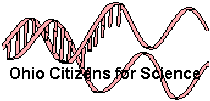
OHIO SCIENCE FACTS
Simply put, science is a way of gaining knowledge about the natural world, and understanding how nature works, through a rigorous process of investigation.
In the 1986 Supreme Court Case of Edwards vs. Aguillard (challenging a Louisiana Creationist statute), a definition of science was presented in an Amicus Curae brief:
"Science is devoted to formulating and testing naturalistic explanations for natural phenomena. It is a process for systematically collecting and recording data about the physical world, then categorizing and studying the collected data in an effort to infer the principles of nature that best explain the observed phenomena. The grist for the mill of scientific inquiry is an ever increasing body of observations that give information about underlying ''facts.'' Facts are the property of natural phenomena. The scientific method involves the rigorous, methodical testing of principles that might present a naturalistic explanation for those facts.
Based on well-established facts, testable hypotheses are formed. The process of testing leads scientists to accord a special dignity to those hypotheses that accumulate substantial observational or experimental support. This special dignity is called a theory. When a theory explains a large and diverse body of facts, it is considered ''robust''; if it consistently predicts new phenomena that are subsequently observed, then it is considered ''reliable.''
Facts and theories are not to be used interchangeably. Facts are the world''s data; theories are explanatory ideas about those facts. An explanatory principle is not to be confused with the data it seeks to explain. Constructs and other non-testable statements are not part of science. An explanatory principle that by its nature cannot be tested is outside the realm of science. Science is not equipped to evaluate supernatural explanations for our observations; without passing judgment on the truth or falsity of supernatural explanations, science leaves their consideration to the domain of religious faith." [Michael Shermer, Why People Believe Strange Things,1999, pp. 167-168]
All science is open-ended; never "fixed"
The acquisition of knowledge through the scientific method is by painstaking assembly of small pieces of understanding - major breakthroughs and revolutions, although highly popularized, are rare.
Science is a messy process.
last updated 8/16/02